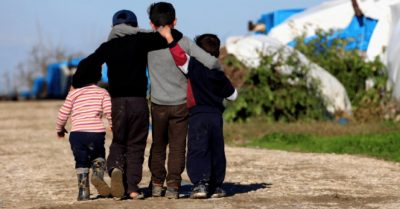As Documents Reveal ‘Pervasive Abuse’ of Immigrant Children Under Obama, Fears It’s Even Worse Under Trump
Thousands of government records "provide a glimpse into a federal immigration enforcement system marked by brutality and lawlessness."

A new report out Wednesday that’s based on government documents details the “pervasive abuse and neglect of immigrant children” in the custody of U.S. Customs and Border Protection (CBP) during the Obama administration—and experts are warning such behavior could be much worse under the Trump administration, infamous for its “dehumanizaing” and “cruel” immigration policies.
Fleeing violence and poverty in Central America, tens of thousands of children come to the United States each year and are detained by CBP, a branch of the Department of Homeland Security (DHS). The report (pdf) from the ACLU and University of Chicago Law School says detained children have faced “physical and psychological abuse, unsanitary and inhumane living conditions, isolation from family members, extended periods of detention, and denial of access to legal and medical services.”
In a series of tweets, the ACLU highlighted some of the particularly egregious cases revealed in the records, which were obtained via a Freedom of Information Act (FOIA) request and are dated from 2009 to 2014. The group also decried the lack of agency accountability, calling agents’ behavior “reprehensible and un-American,” and warning the practices could worsen under the Trump administration.
Officials at @CBP allegedly:
• Kicked a child in the ribs
• Ran over a 17yo with a patrol car
• Sexually assaulted a 16yo girl in a search
• Detained a 4lb premature baby and her mother in an overcrowded and dirty cell full of sick people— ACLU (@ACLU) May 23, 2018
All human beings deserve to be treated with dignity and respect regardless of their immigration status — and children, in particular, deserve special protection. The abuse that takes place by government officials is reprehensible and un-American.
— ACLU (@ACLU) May 23, 2018
The amount of children who have come forward about various forms of abuse suggests that such treatment by U.S. officials is commonplace. The report notes that:
- a quarter of kids reported physical abuse, including sexual assault and beatings by CBP agents;
- more than half reported verbal abuse such death threats, and denial of necessary medical care, including cases that led to children requiring hospitalization; and
- 80 percent reported inadequate food and water.
“Beyond the misconduct detailed,” the report points out that these “documents are shocking for the independent reason that they do not contain any evidence of disciplinary action or other meaningful accountability for abusive CBP officials,” in spite of the fact that DHS has multiple internal oversight agencies.
“The misconduct demonstrated in these records is breathtaking, as is the government’s complete failure to hold officials who abuse their power accountable,” said ACLU Border Litigation Project staff attorney Mitra Ebadolahi. “These documents provide a glimpse into a federal immigration enforcement system marked by brutality and lawlessness.”
The records were obtained by two regional affiliates of the ACLU as part of ongoing litigation, and developed into a report by students in the International Human Rights Clinic at the University of Chicago.
“The students reviewing these records were shocked by the abuse and neglect these children were subjected to at the hands of U.S. officials,” said clinic director Claudia Flores. “The fact that these children were already so vulnerable—most traveling alone in hopes of escaping violence and poverty in their home countries—made the unlawful and inhumane actions reflected in the documents even more distressing.”
Considering that the “documents show that abuse occurs at each stage of a child’s interaction with CBP, from apprehension to detention to deportation,” the report concludes that “urgent intervention is necessary to protect these vulnerable children from mistreatment, abuse, and violence, which is otherwise bound to recur.”
*
This work is licensed under a Creative Commons Attribution-Share Alike 3.0 License
Featured image is from ACLU.

